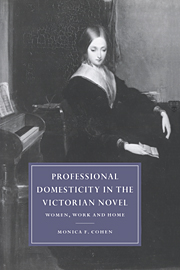Book contents
- Frontmatter
- Contents
- Acknowledgments
- Introduction
- 1 Persuading the navy home: Austen and professional domesticism
- 2 Homesick: the domestic interiors of Villette
- 3 Dickens I: Great Expectations and vocational domesticity
- 4 Dickens II: Little Dorrit in a home: institutionalization and form
- 5 Professing renunciation: domesticity in Felix Holt
- 6 A prejudice for milk: professionalism, nationalism and domesticism in Daniel Deronda
- Afterword
- Notes
- Selected bibliography
- Index
- CAMBRIDGE STUDIES IN NINETEENTH-CENTURY LITERATURE AND CULTURE
6 - A prejudice for milk: professionalism, nationalism and domesticism in Daniel Deronda
Published online by Cambridge University Press: 10 November 2009
- Frontmatter
- Contents
- Acknowledgments
- Introduction
- 1 Persuading the navy home: Austen and professional domesticism
- 2 Homesick: the domestic interiors of Villette
- 3 Dickens I: Great Expectations and vocational domesticity
- 4 Dickens II: Little Dorrit in a home: institutionalization and form
- 5 Professing renunciation: domesticity in Felix Holt
- 6 A prejudice for milk: professionalism, nationalism and domesticism in Daniel Deronda
- Afterword
- Notes
- Selected bibliography
- Index
- CAMBRIDGE STUDIES IN NINETEENTH-CENTURY LITERATURE AND CULTURE
Summary
Emerging from Felix Holt is a vision of the home-crafter as a civics specialist. She, or he, qualifies as a kind of civics professor not only by doing selfless work for a collective good but by virtue of the exemplary value residing in a career composed of such deeds. In this the home-crafter resembles the professional Weber describes in a different context as following an ethic of ultimate ends. Whereas the professional who follows an ethic of responsibility might, like Will Ladislaw, choose a political career whereby he could vote for laws requiring factory-owners to pay their workers a minimum subsistence wage, the professional who follows an ethic of ultimate ends might, like Shirley's Caroline Helstone in her self-flagellating relationship with the factory-owning Robert Moore, believe that playing cards or reading Shakespeare in the company of a specific factory-owner can eventually instill in him a sense of responsibility for his workers' welfare. For Weber, both careerists are professional politicians, but each perceives the primary sphere of moral action in different places.
In this light, the homecraft typical of Victorian mid-century domestic plots can be understood as a type of ethical profession and the home-bound novel seen as a version of the novel of vocation rather than an alternative to it. As professional culture develops during the last part of the nineteenth century, however, domesticity becomes one among several other competing lines of professional plot development.
- Type
- Chapter
- Information
- Professional Domesticity in the Victorian NovelWomen, Work and Home, pp. 151 - 185Publisher: Cambridge University PressPrint publication year: 1998
- 1
- Cited by



